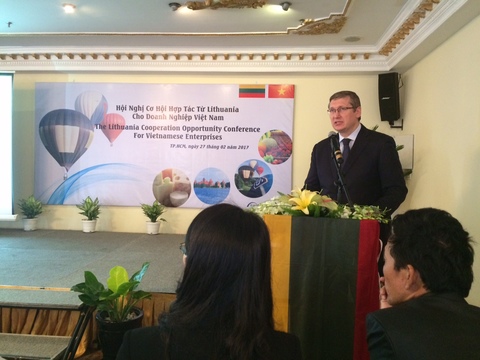
Mindaugas Kuklierius, agricultural attaché of the Republic of Lithuania to China, South Korea, Viet Nam and Mongolia, sees very good bilateral co-operation opportunities in several areas including trading in agricultural and food products. — VNS Photo Xuan Huong
The huge potential that exists for Vietnamese and Lithuanian firms to co-operate in many sectors and areas “needs to be stimulated,” a conference heard on February 27.
Speakers highlighted agricultural and food products, education, tourism and high-tech sectors as particular areas for promoting economic ties between the two countries.
Located on the eastern shore of the Baltic Sea, Lithuania is the largest of the three Baltic States by population, territory and the market, and ranks first in EU for the GDP per capita growth.
Arunas Karlonasz, commercial attaché of the Republic of Lithuania to China, South Korea, Viet Nam and Mongolia, said trade between Việt Nam and Lithuania has increased significantly in recent years, but it was still modest and “needs to be stimulated.”
Lithuania’s main goods exports to Viet Nam are plant and animal origin products, food, furniture, wood products and medical instruments. It import from Viet Nam plant and animal origin products, minerals and electrical machinery.
Nguyen The Kien, chairman and CEO of Saigon Star Company, said it is very difficult at present to find Vietnamese, Chinese or other Asian products in the Lithuanian market.
This was due to a disadvantage in transportation and a lack of understanding about each other’s markets, he said.
He urged Vietnamese companies to study the market further so as to better tap its potentials.
“Located in the geographical centre of Europe, Lithuania is a good gateway for Vietnamese goods to penetrate other countries in the European market,” he said.
Mindaugas Kuklierius, agricultural attaché of the Republic of Lithuania to China, South Korea, Viet Nam and Mongolia, said agriculture and food industries played a significant role in the Lithuanian economy, with their export revenue accounting for 19.4 per cent of total Lithuania’s exports in 2015.
He said Lithuania exports to more than 100 countries, and hoped Viet Nam will become one of its large export markets soon.
The dairy industry is a key agricultural production sector, producing about 2 million tonnes of milk a year, half of which is used for export. The industry’s most important product is cheese, Kuklierius said.
Lithuanian businesses have thus far exported some meat products, including chicken swings, to Viet Nam, but the volume remained modest, and “we want to improve in the future,” he added.
Lithuania does not produce certain kinds of fruits and vegetables because of unsuitable climate, which means “we have to import quite a lot. Việt Nam has a very good climate to grow fruits and vegetables, so we can co-operate.”
Viet Nam exports different kinds of fruits and vegetables and canned products to Europe, and Lithuania should not be excluded from this list, he said.
“I see very good opportunity for co-operation in trading for agricultural and food products with Viet Nam. In Lithuania we produce and grow food products that you do not have here or you are not strong in, and you are very strong in fruits, fish and products that we don’t have. So we can easily exchange and increase our co-operation in the future”.
Commercial attaché Karlonasz said that besides agriculture and food industries, possibilities for further expansion of bilateral trade ties lie in the IT, biotechnology, lasers, medical devices, pharmacy and hi-tech sectors.
“Viet Nam has quite highly skilled professionals working in the IT sector, while Lithuania and even EU lack such people. This could be an area for strengthening our co-operation.”
He also called on Vietnamese businesses to invest in the manufacturing industry in Lithuania so as to supply goods to the EU market.
Ina Marciulionyte, Ambassador of Lithuania in Beijing and accredited to Viet Nam, encouraged Vietnamese businesses to open restaurants in Lithuania “because we have no Vietnamese restaurant in the country at present.
“We would also encourage students from Việt Nam to study in our country because we have good universities and offer programmes in English at competitive prices compared to the rest of European countries.”
There is no direct flight between the two countries, but there are four operating international airports in Lithuania that offer direct flights to and from many European cities, she said.
In the future, when travel demand increases strongly, a direct flight can be established, she said.
Delegates at the conference organised by the Saigon Star Company also said that the upcoming EU-Viet Nam Free Trade Agreement FTA would help expand trade between the two countries. — VNS